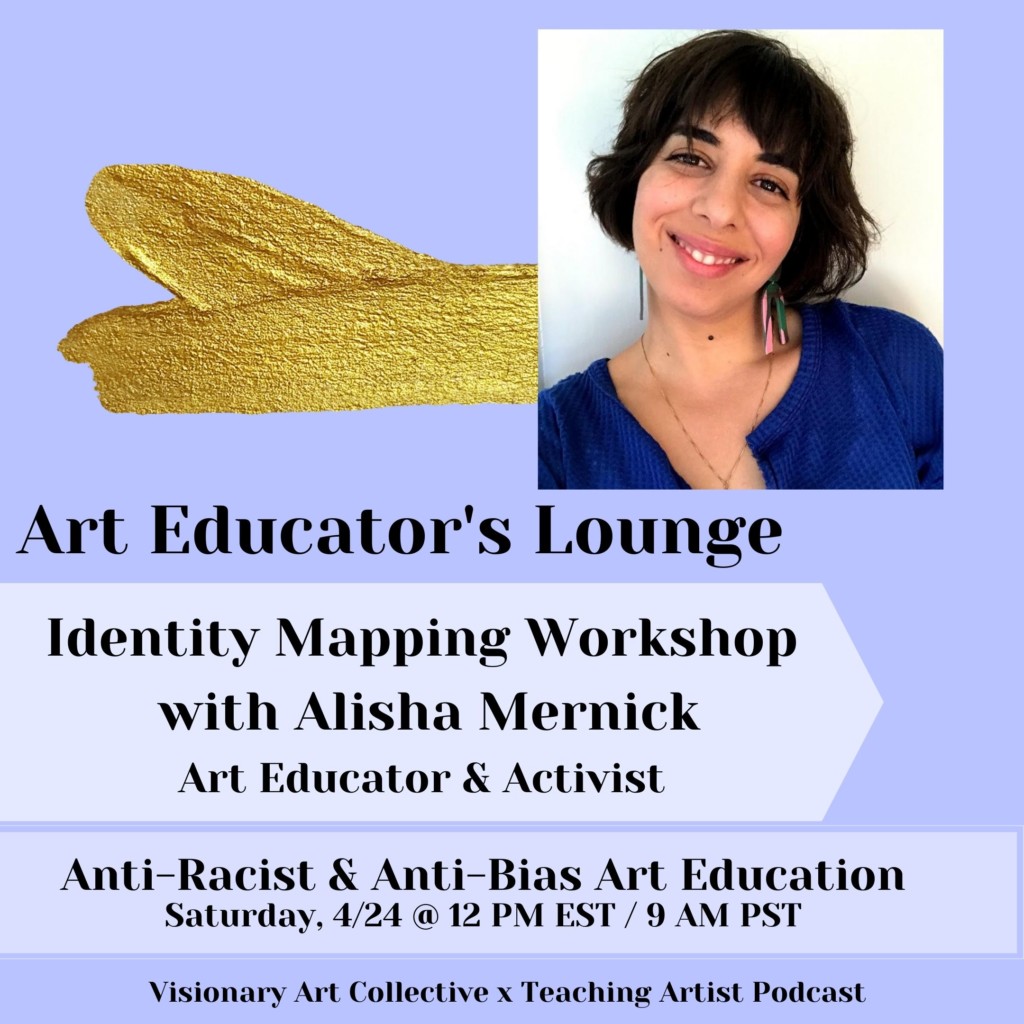On Saturday, 4/24 we came together as a community to participate in an Identity Mapping workshop led by Alisha Mernick. Alisha is an Art Educator & Activist who has been implementing liberatory, critical arts pedagogy in K–12 classrooms for over a decade. In this 1-hour workshop, Alisha led us through an Identity Mapping exercise, which allowed us to deconstruct our identities and reflect on how those identities impact our relationship to art and art education. Additionally, we engaged in a rich conversation about how we can facilitate these same types of conversations with our students.
A key takeaway was that educators need to first begin doing “the work” both individually and within their classrooms before diving into a project like this. Reading (there are some fantastic suggestions below) and reflecting to unpack your own biases and then working to keep those reflections in mind is important to do before you can help students unpack their biases. Facilitating a safe space in your classroom for students to be vulnerable and create deeply personal artwork starts long before introducing this project.
During our discussion, we shared resources centered around social justice and anti-racist teaching.
Suggested Resources:
Books
- This Book Is Anti-Racist: 20 Lessons on how to Wake Up, Take Action, and Do the Work by Tiffany Jewel
- White Fragility by Robin DiAngelo
- How to be an Anti-Racist by Ibram X. Kendi
- Sisters in Hate: American Women on the Front Lines of White Nationalism by Seyward Darby
- Cultivating Genius: A Four-Layered Framework for Culturally and Historically Responsive Literacy by Gholdy Muhammad
- Alisha’s list of recommended books: https://bookshop.org/shop/AlishaMernick
Websites
- https://www.learningforjustice.org/
- https://www.learningforjustice.org/magazine/publications/speak-up-at-school
- https://courageousconversation.com/about/
- https://www.morningsidecenter.org/about
- https://docs.google.com/document/d/1wa-H7gYPqvz1KnuW-TJ3u2KHC03l_AW3LIF_ZTrbrJ0/edit?usp=sharing
- https://brenebrown.com/unlockingus/
- https://barwe215.weebly.com/august-2018-why-do-white-teachers-need-to-talk-about-race.html
- Liz Kleinrock: @TeachandTransform https://www.instagram.com/teachandtransform/
- Alisha Mernick: @msmernickart https://www.instagram.com/msmernickart/
- Dr. Becky Kennedy: @drbeckyatgoodinside https://www.instagram.com/drbeckyatgoodinside/
- Flavia Zuñiga-West and Sydney Snyder: @addingvoices https://www.instagram.com/addingvoices/
Additional Resources from Alisha’s shared Google Doc
CAEA EQUITY, DIVERSITY, AND INCLUSION COMMISSION QUICK START GUIDE + RECOMMENDED RESOURCES
Read: Anti-Racist/Anti-Bias Art Education & Critical Multiculturalism
- James Haywood Rolling Jr. – Making Black Lives Matter: Toward an Anti-Racist Artmaking and Teaching Agenda Pt. 2
- “What is the potential of multiculturalism in art?” (Article, Nameorg.org)
- Rethinking Multicultural Education (Book, Rethinking Schools)
- Journal of Cultural Research in Art Education (jCRAE online)
- Social Justice Art: A Framework for Activist Art Pedagogy by Marit Dewhurst
- NAEA “Getting Started with ED&I” Guide
- What is the potential of multiculturalism in art? (Article on nameorg.org)
Read: Pedagogy + Teaching
- Paolo Friere – Pedagogy of the Oppressed
- bell hooks – Teaching To Transgress + Art On My Mind
- Bettina L. Love – We Want To Do More Than Survive
- Beverly D. Tatum – Why Are All the Black Kids Sitting Together in the Cafeteria?
- Christopher Emdin – For White Folks Who Teach in the Hood… And the Rest of Ya’ll Too: Reality Pedagogy and Urban Education
- Howard Stevenson – Promoting Racial Literacy in Schools: Differences That Make a Difference
- Carla Shalaby – Troublemakers: Lessons in Freedom from Young Children at School
- Cornelius Minor – We Got This.: Equity, Access, and the Quest to Be Who Our Students Need Us To Be
- Gholdy Muhammad – Cultivating Genius: An Equity Framework for Culturally and Historically Responsive Literacy
- Zaretta Hammon – Culturally Responsive Teaching and The Brain: Promoting Authentic Engagement and Rigor Among Culturally and Linguistically Diverse Students
- The Empowering Educators Guidebook on Race & Racism
Watch/Listen
- Nice White Parents (podcast)
- The 1619 Project (podcast & curricular resources)
- Code Switch (podcast, ongoing)
- Seeing White (podcast)
Inclusive Art Lessons + Artists: Websites featuring Contemporary + BIPOC Artists
- Art21 Clips: Kerry James Marshall , Kara Walker, & Nick Cave
- Representation Matters – Lizzie Fortin Article & Slide Deck of Artists
- Collection of BIPOC artists on Anti-Racist Art Teachers
- List of black artists, and anti-racist resources from PAEA
- Davis Publications list of EDI related articles and lesson resources.
A big topic that came up in our discussion, which we’ve also heard from several teachers via email and DM, was how to bring discussions around bias and social justice into classrooms where students, parents, and even admin do not support this work. Ideas/advice that was shared included:
- Share the work and words of artists and ask a lot of questions rather than sharing your opinions
- Facilitate space for students to share their opinions and experiences
- Seek out like-minded teachers and create cross-disciplinary projects so you are not alone in this work
- Bring in school counselors if possible to connect supportively 1:1 with students as well as to back you up by sharing with parents and admin the research-backed need for such discussions
- Know where the line is between rocking the boat and being fired – check in with your admin before beginning a project/unit that may be seen as controversial with parents/students
- Be willing to take a stand when needed. Language from parenting small children can be helpful: “My job is to keep all of my students safe, and speech or imagery attacking any student is never okay in my classroom.”
If you have additional advice or experience around ABAR teaching in an environment or community that is not supportive of critical multiculturalism, and are willing to share, please contact Rebecca to share your experience at rebecca@teachingartistpodcast.com

